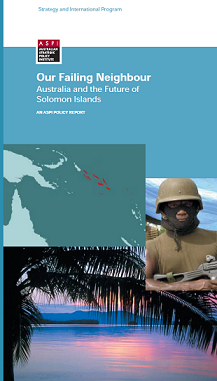
A decade ago today, lead elements of the nearly 2,000 troops, police, and officials from the nine Pacific Islands Forum countries initially comprising the Regional Assistance Mission to Solomon Islands (RAMSI) arrived to begin their stabilisation efforts.
Six weeks before, an ASPI report, on Australia and the future of Solomon Islands, had concluded that “… a failing state on our doorstep engages Australia’s interests at many levels, from short-term economic, consular and humanitarian concerns to our most enduring strategic imperatives. … [Australia should] initiate and support a sustained and comprehensive multinational effort, which, with the consent of Solomon Islands, would undertake a two-phase program to rehabilitate the country.”
That report suggested a ten year, $850 million, initiative ‘of which Australia could expect to pay perhaps half’—although both the estimated total and share were less than the final bill. Australian and NZ investment so far (including through bilateral aid, and approximately $350 million military expenses) has been around two billion dollars, and Australia has suffered two operational fatalities.
The mission comprised a first stage to address the immediate short-term problems of violence and corruption and a second stage to help build new political structures and security institutions and address underlying social and economic problems. The military component of RAMSI concluded almost exactly a decade later on 1 July this year, as the governance, state-building and development assistance component began transitioning in earnest into the long-term donor programs of Australia, NZ, the EU, World Bank, ADB and others—leaving the policing element as the key continuing component of the mission.
ASPI has subsequently contributed to analysis of various aspects of the mission, including the complex causes of violence from 1998; early findings to help hone RAMSI approaches; military and security lessons learned; implications of the intervention for future regional engagement; the evolving discourse surrounding regional state fragility; lessons for the sustainability of future such missions; remaining risks to continuing peace and stability; and requirements for successful transition beyond RAMSI, including managing dependency.
Recent analysis remains fairly unanimous that the muscular approach to the challenging but straight-forward initial security mission worked well to quickly disarm the militias—providing an environment conducive to wider success. Academic analysis currently centres on the extent to which the both difficult and complicated business of rebuilding political, economic, social and security structures has represented the best possible return on the region’s investment, and debating whether there were realistic alternatives to outside governments’ natural focus on state-building.
Karl Claxton is an analyst at ASPI.